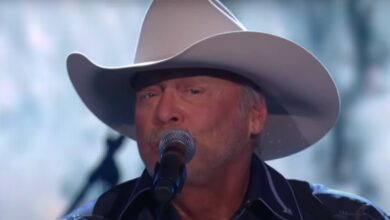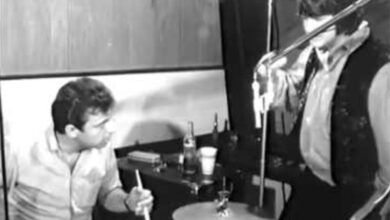Elvis’s Last Show: A Brave Attempt Amid Evident Health Challenges
Elvis Presley, known as the “King of Rock and Roll,” holds an everlasting legacy in the realm of music and entertainment. His blend of various music genres, from rock and roll and pop to gospel and blues, revolutionized the music industry and inspired countless artists. Born on January 8, 1935, in Tupelo, Mississippi, Presley rose to prominence in the 1950s with his dynamic performances and a unique style that blended charisma, powerful vocals, and an innovative approach to rhythm and blues. He quickly became a cultural icon, breaking barriers in race relations and sexuality through his music and public persona.
In the decades that followed, Presley produced a string of chart-topping hits that included “Heartbreak Hotel,” “Hound Dog,” and “Jailhouse Rock.” His distinctive voice and style captivated fans around the world, turning him into a superstar. He made several notable appearances on television, including “Elvis Presley Elvis” and the iconic “68 Comeback Special,” which showcased his return to live performance after a period in the film industry. His energetic and often provocative live performances set the standard for future rock concerts.
Presley’s impact extended beyond music. He became a symbol of the shift in American culture during the post-war era—a youth-driven movement that embraced the rebellious spirit of rock and roll. His influence can be seen in the music of future generations of artists, including those from various genres, all of whom cite him as an inspiration. From the Beatles to modern hip-hop artists, Presley’s reach and lasting impact are undeniable.
However, as his career flourished, Presley’s personal life began to take a toll. He struggled with the pressures of fame, leading to increasing reliance on prescription medications and alcohol. These struggles culminated in his untimely death in 1977 at the age of 42. Elvis’s passing was a shock to many, reflecting the broader issues of celebrity culture and the challenges associated with mental health, addiction, and the pressures of public life.
In the last years of his life, Presley continued to tour extensively, performing more than 50 shows in 1977 alone. Yet his health was visibly declining, which became increasingly apparent to his audience. His final concert performance at the Market Square Arena in Indianapolis showcased both the fragility and strength of his artistry. Although visibly weighed down by his struggles, he still managed to deliver powerful renditions of his classic hits, reaffirming why he was considered an unmatched vocal talent.
The contrast in the quality of his performances during his last concerts serves as a testament to his artistry even in the face of adversity. While the heartfelt introduction to “Unchained Melody” marked a moment of clarity and grace, the later performance of “Are You Lonesome Tonight?” highlighted his struggles with health. Yet even in that final performance, his passion shone through, and the emotions he conveyed resonated deeply with fans.
Jerry Schilling, one of Elvis’s closest friends, shared accounts of their time together and noted how Presley, despite his challenges, remained dedicated to his fans. This dedication was apparent during the filming of “Elvis in Concert,” where he participated against the advice of those close to him. Schilling also recounted Presley’s humor and warmth, indicating that even in his struggles, he sought to connect with those who adored him.
Despite the challenges Presley faced, his musical legacy endures. The emotional depth of his songs, coupled with his unique vocal abilities, has cemented his place in music history. Fans and music historians continue to explore the nuances of his career, searching for the ways in which he articulated the joys, sorrows, and complexities of love through his songs.
Elvis Presley’s life story—a mix of triumph and tragedy—reminds us of the potent impact of music on culture and the human experience. His journey has inspired a multitude of documentaries, films, and books, ensuring that his story continues to resonate with new generations of music lovers. From his iconic hairstyles and fashions to his unforgettable songs, Elvis remains an inextricable part of the fabric of American music history.
Today, fans visit Graceland, his famed estate in Memphis, Tennessee, celebrating his life and career. Visitors can experience the legacy of the King through memorabilia, exhibits, and live performances that echo the spirit of the man who changed the music landscape. Elvis continues to be a source of inspiration and admiration, a testament to how one person’s passion can profoundly impact the world. The lasting power of Elvis Presley’s music and persona underscores the notion that while the King has passed, his influence lives on, uplifting spirits and inspiring creativity around the globe.





